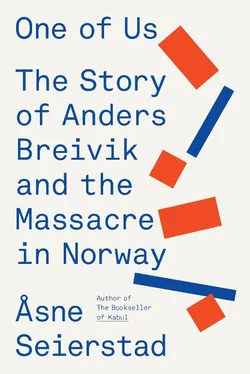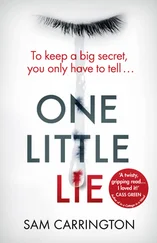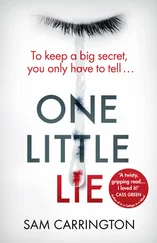The prosecution’s conclusion: not accountable for his actions.
* * *
On the final day of the trial, the aggrieved parties were to make impact statements, as is standard procedure in Norwegian courts. An employee in the government quarter grieved for lost colleagues; three mothers remembered their children and talked about how losing them had affected their whole family. The General Secretary of the AUF spoke about the loss to the political organisation; and finally, a girl who had lost her sister was to end the session.
The seventeen-year-old had been called by her public advocate the previous evening and asked if she could make the closing statement of the trial.
I can’t do it, Lara thought.
She said, ‘Yes, I can.’
On the busy morning ferry into the city, the ferry that Bano had loved, she sat looking out over the fjord, wondering what she was going to say.
How could she explain what losing Bano meant?
She was going to meet four friends at Check Mate, the café by the courthouse. The waiter lent her an order pad and a pen. She started writing, and then read it out. Her friends listened and made criticisms and suggestions. More of this, less of that. Only the best was good enough here. ‘You’ve got to include where you all come from!’ they said. ‘Who you are, who Bano was!’
She wanted to opt out. She couldn’t go through with it. She was freezing in her white crocheted top and her jeans felt too tight. But it was time to go. Her feet carried her past the security check, in through the heavy doors, up the winding staircase and into room 250.
Now she was on her way up the central aisle. Now she was going to face her sister’s murderer.
She took her place in the witness box, afraid her voice would give way. Then she noticed a pair of eyes on her. The pregnant Colombian lay judge with the long dark curls was looking at her. She has kind eyes, thought Lara, and put down her piece of paper. She would say the most important things about Bano. What she had in her heart.
‘Bano and I fled from Iraq in 1999. We fled from the civil war and Saddam Hussein. I had a real struggle with all the trauma and it took me a long time to feel safe here. I had nightmares that the police would come and get us. Bano helped me. There’s two years between us, but we shared all our secrets. I remember her saying, “Even if you happen to lose friends, you’ll never lose me.”’
Her voice held. ‘I had no idea then that she would be the one I lost first of all.’
Lara spoke of how she had done nothing but sleep in the time after Utøya. ‘I dreamt that I was dead and she was the one alive. I mixed up what was real and what wasn’t, and when I woke up I thought real life was the nightmare. It took me several months to understand what was what. It’s made me feel guilty seeing how sad people are. It should have been me who died, then not so many people would have been sad.’
She managed to be entirely honest.
‘When everyone was grieving, I just felt I was in the way. It wrecked my self-confidence. I was born as a little sister. I’ve never lived a life just as a big sister.’
There were ripples of movement along the rows of seats. It was the last day. It was over. But not for Lara.
‘I had to learn to do things myself. I had to learn to start trusting other people. It’s been a difficult time and I don’t want to live like this. He didn’t only take away my security, he took away the safest person in my life. The sorrow is as great as ever, the sense of loss is even greater, but there’s something new.’
She paused.
‘Hope. It wasn’t there before. Bano didn’t die for nothing. She died for a multicultural Norway. There’s a huge empty hole and I’m heartbroken that she won’t be at my wedding or see my children. But I’m proud of her, and I know she wants me to be happy.’
That was the way she ended. Bano was with her.
She turned towards her parents as she left the witness box. Their eyes were moist. Her father raised his hand and gave a little wave. So did her mother.
Lara felt warm all over. Their looks said: We are proud of you. We are so glad you are alive.
On 24 August 2012 the verdict was to be pronounced. The courtroom filled once more with the world press, who had lost interest after the first couple of weeks. There was pressure on seats again.
The accused was in place, his right-wing extremist salute was back, the prosecution came, the public advocates, the defence, the audience.
The judges entered and everyone stood up.
Wenche Arntzen remained standing to read the decision.
‘Anders Behring Breivik, born 13 February 1979, is convicted of breaching §147a of the legal code, clause one letters a and b… to detention in custody…’
A smile spread across Breivik’s face. Accountable for his actions!
He received the maximum penalty the law allowed: twenty-one years. But detention in custody meant that, as long as he represented a threat to society, the sentence could be extended by five years, another five years, another five years – until death claimed him.
He slid down the cliff.
And threw himself behind a rock.
He slithered down the cliff.
And ran under the ledge.
He skidded down on soil and gravel.
And crept behind a boulder.
He leapt down in long strides.
He readied himself. Three jumps and he’d be down.
You know, Tone, our Simon’s a fast runner and a good swimmer.
He had said on that Friday.
How many times had he slid down that cliff for Simon…
He slid in the night, he slid in the day, he slid in his dreams.
A hundred times. A thousand.
Over and over again he saw his son in front of him – jumping over the log, not stopping halfway, but sliding on.
Run, Simon! Run!
Gunnar slid.
He slithered.
And then he stumbled.
Losing Simon was like falling into a black hole.
* * *
Masterbakk Lake lay tranquil. Occasional little rings spread across the surface; an Arctic char came up for air. Some ravens flew over the treetops.
It was late summer, two years after. Tone had gone to bed. Gunnar was sitting up.
He felt he had failed as a dad. Something had gone wrong in the upbringing of his son. He who had taught the boy about the dangers of nature: wolves, bears, avalanches. Storms, angry elks and deep water.
It had let him down when it really mattered.
Why did he wait so long to run? Why did he stay there, lifting people down, and not get away himself? He must have realised he had to run now !
They had brought the boys up to be considerate. Help others. Let others go first. Gunnar remembered when he had been the trainer of the boys’ football team in Salangen. They had gone to compete in the Norway Cup, and Simon was angry because he did not get very long on the pitch, even though he was good. Gunnar impressed on him that they were all equal, the good players and the slightly less good. Everyone would play for exactly the same length of time, and if there was not enough match time for everybody, Simon would have to come off first. That was just the way it had to be.
* * *
Gunnar was back at his work in industrial and commercial development in Salangen. Sitting around idly did nothing to help. Tone was working three days a week with special needs children.
Håvard had got a place at a folk high school in Voss, on their sport and outdoor recreation programme.
But first he had gone to enrol for military service. When it came to filling in his personal details, he ground to a halt. Name, address, parents… siblings…
Читать дальше












